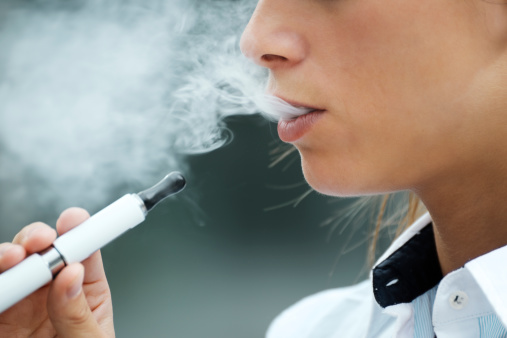E-Cigarettes May Be Hazardous

Electronic cigarettes have grown in popularity over the past few years, despite concerns in the medical and public health communities about the possible consequences of the nicotine delivery system. The federal Food and Drug Administration recently issued proposed rules to regulate e-cigarettes to protect the public from possible negative health consequences, prevent young people from becoming addicted to nicotine and keep tabs on how e-cigarette products are manufactured and marketed.
According to an e-industry trade group, 4 million people use e-cigarettes to get their fix of nicotine, ABC News reports. But the products may not be safe, raising concerns about product liability.
E-cigarettes work by vaporizing a concoction that blends nicotine with propylene glycol, flavorings and other additives. A heating element, called a cartomizer, boils the nicotine-infused liquid and releases vapor that users inhale. The small particles in the vapor can travel deep into the user’s lungs. As a consequence some researchers assert that e-cigarettes can cause or worsen respiratory problems.
Some people view e-cigarettes as a safe alternative to smoking traditional cigarettes, cigars or pipes, but this assertion is not backed up by much scientific evidence. A recent study indicates that the vapor produced by e-cigarettes may be more harmful than people initially thought, Gannett News Service reports. Partly due to the notion that e-smokes are safer than regular smokes, consumers have spent billions of dollars on the devices, which can range in price from a few dollars to $100.
The new FDA rules will likely take at least a year to go into effect, according to a report in the New York Times.
Marketing to Kids?
The FDA regulations ban the sale of e-cigarettes to minors, although many states have already passed laws to prevent the sale of e-cigarettes to young people. Health advocates are cheering the FDA’s efforts to keep the devices out of the hands of youngsters who are in danger of becoming addicted to nicotine.
Critics of e-cigarettes point out that adding flavoring to nicotine syrup is one way that the industry can market their products to kids. E-cigarette liquid is available in hundreds of flavors like vanilla, grape and watermelon, and e-cig skeptics believe that these tempting flavors, coupled with the lack of a smoky smell, make the devices very appealing to children.
Since e-cigarettes started to gain popularity in the mid-2000s, the market has become flooded with e-cigarette liquids of unknown chemical mixtures. E-cigarette vapor reaches the deepest part of the respiratory system and the chemical compounds in the vapor particles are dissolved into the tissue of the lung. So the idea that manufacturers are not strictly regulated or required to disclose their ingredients is troubling to public health officials.
Required Disclosure
However, the market free-for-all in e-cigarette products will soon come to an end: The new FDA rules require manufacturers to disclose the list of ingredients that go into e-cigarette products and mandate that e-cigarette products bear health warning labels.
One of the reasons people purchase e-cigarettes is to stop smoking regular cigarettes, but research suggests that using e-cigarettes does little to help break the cycle of addiction to smoking tobacco. A recent analysis of 84 different studies concluded that e-cigarettes do not help smokers quit. Dr. Stanton Glanz of University of California San Francisco who co-authored the analysis said those who use e-cigarettes are less likely to quit smoking than smokers who done use e-cigarettes.
At the end of the day, e-cigarettes are tremendously popular in spite of all that’s unknown about them. As time goes on and the FDA’s new rules come into play, American consumers will have a greater sense of confidence that e-cigarettes have proper regulatory oversight. For now, the protections are limited and not much is known about e-cigarettes’ long-term health effects, so buyers should be wary of what they find on the shelves of convenience stores, smoke shops and other retail outlets that sell the devices.
Blog CATEGORIES
Let's Talk About It
Speak with an experienced attorney at no cost to you

